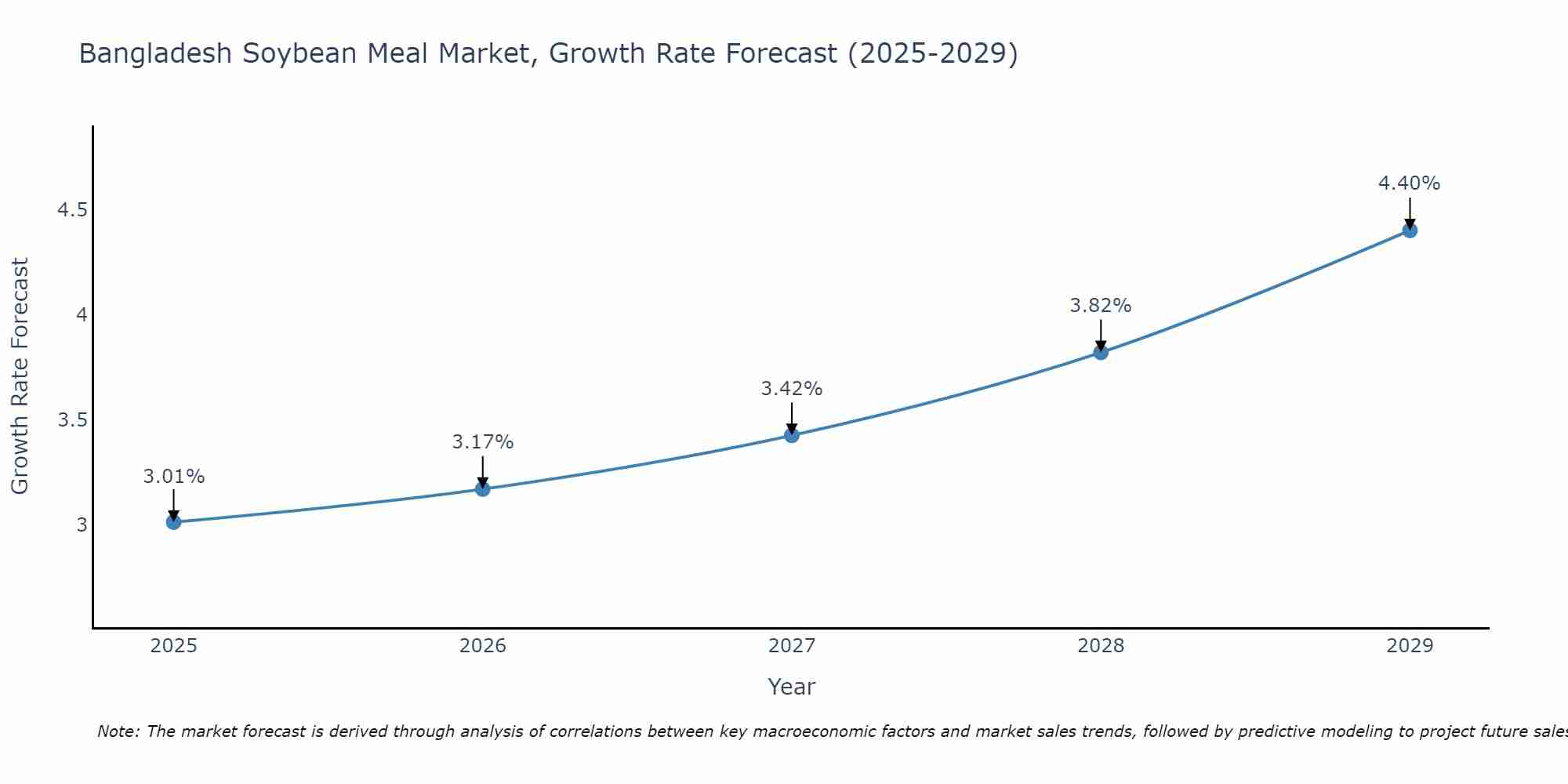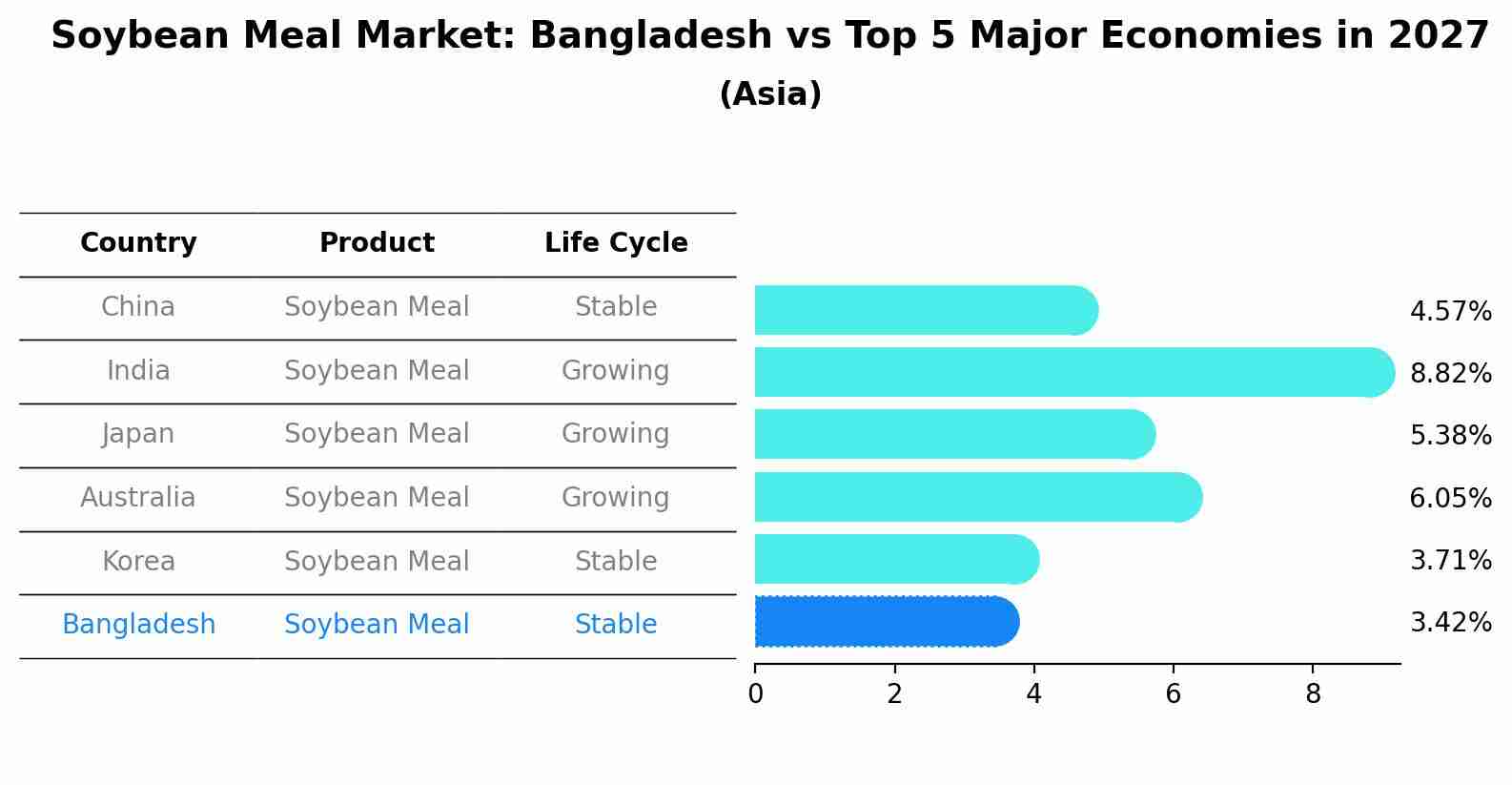Bangladesh Soybean Meal Market (2025-2031) Outlook | Growth, Industry, Revenue, Value, Share, Forecast, Trends, Companies, Size & Analysis
| Product Code: ETC384992 | Publication Date: Aug 2022 | Updated Date: Jul 2025 | Product Type: Market Research Report | |
| Publisher: 6Wresearch | Author: Dhaval Chaurasia | No. of Pages: 75 | No. of Figures: 35 | No. of Tables: 20 |
Bangladesh Soybean Meal Market Size Growth Rate
The Bangladesh Soybean Meal Market is poised for steady growth rate improvements from 2025 to 2029. The growth rate starts at 3.01% in 2025 and reaches 4.40% by 2029.

Soybean Meal Market: Bangladesh vs Top 5 Major Economies in 2027 (Asia)
In the Asia region, the Soybean Meal market in Bangladesh is projected to expand at a stable growth rate of 3.42% by 2027. The largest economy is China, followed by India, Japan, Australia and South Korea.

Bangladesh Soybean Meal Market Synopsis
The Bangladesh soybean meal market is experiencing steady growth driven by increasing demand in the animal feed industry. Soybean meal is a key protein source for livestock feed production in the country, particularly for poultry and aquaculture sectors. The market is influenced by factors such as rising meat consumption, expanding livestock production, and the growing awareness of the nutritional benefits of soybean meal. Key players in the market include local feed manufacturers, importers, and multinational companies. However, challenges such as fluctuating prices of soybeans in the international market, limited availability of raw materials, and competition from alternative protein sources pose potential constraints to market growth. Overall, the Bangladesh soybean meal market is poised for further expansion with opportunities for innovation and market development.
Bangladesh Soybean Meal Market Trends
The Bangladesh soybean meal market is witnessing a growing demand due to its nutritional benefits and versatility in animal feed formulations. The increasing adoption of soybean meal as a protein source in livestock and poultry feed is driving market growth. Additionally, the rising awareness among farmers about the benefits of soybean meal in improving animal health and productivity is contributing to its popularity. With the government focusing on promoting the domestic production of soybean to reduce dependency on imports, there is a growing emphasis on increasing soybean cultivation in the country. Overall, the Bangladesh soybean meal market is experiencing a positive trend with expanding applications in animal feed and a shift towards self-sufficiency in soybean production.
Bangladesh Soybean Meal Market Challenges
In the Bangladesh Soybean Meal Market, several challenges are faced, including fluctuating prices of soybean meal due to global market dynamics, dependency on imports leading to vulnerability to currency exchange rates, limited domestic production capacity, and inconsistent quality of imported soybean meal. Additionally, lack of awareness among farmers and feed manufacturers about the benefits of soybean meal as a protein source, limited research and development efforts to improve soybean cultivation and processing techniques, and competition from other protein sources like fishmeal and poultry by-products pose challenges in market penetration and growth. Regulatory barriers and trade restrictions further impact the market dynamics, making it challenging for stakeholders to navigate and capitalize on the opportunities present in the soybean meal sector in Bangladesh.
Bangladesh Soybean Meal Market Investment Opportunities
Investment opportunities in the Bangladesh Soybean Meal Market include potential growth in demand driven by increasing livestock and poultry production, as soybean meal is a key feed ingredient. The market is also benefitting from government initiatives to boost agricultural productivity and reduce dependency on imports. Additionally, the growing health consciousness among consumers is driving demand for protein-rich food products, further increasing the consumption of soybean meal. Investing in soybean meal production facilities or trading companies, as well as engaging in strategic partnerships with local farmers or feed manufacturers, could be lucrative opportunities in this market. However, it is important to consider factors such as volatile soybean prices, competition from other feed ingredients, and regulatory challenges when evaluating investment prospects in the Bangladesh Soybean Meal Market.
Jordan Agar Market Government Policies
Government policies related to the Bangladesh Soybean Meal Market primarily focus on promoting domestic production and reducing reliance on imports. The government encourages local farmers to cultivate soybeans through subsidies, training programs, and access to credit facilities. Import tariffs and duties are imposed on soybean meal imports to protect domestic producers and support self-sufficiency in feed production. Additionally, the government monitors and regulates the quality standards of soybean meal to ensure food safety and animal health. Overall, the policies aim to enhance the competitiveness of the domestic soybean industry, reduce import expenditure, and strengthen food security in Bangladesh.
Bangladesh Soybean Meal Market Future Outlook
The future outlook for the Bangladesh Soybean Meal Market appears promising due to the growing demand for protein-rich animal feed in the country`s expanding livestock industry. With a rising population and increasing disposable income levels, the demand for poultry, dairy, and aquaculture products is expected to drive the consumption of soybean meal as a key ingredient in feed formulations. Additionally, as consumers become more health-conscious, there is a trend towards higher consumption of animal protein, further supporting the demand for soybean meal. However, challenges such as price volatility, competition from alternative feed ingredients, and fluctuations in international soybean prices could impact the market`s growth trajectory. Overall, continued investments in the agricultural sector, technological advancements in feed production, and strategic partnerships with key stakeholders are likely to shape the future of the Bangladesh Soybean Meal Market positively.
Key Highlights of the Report:
- Bangladesh Soybean Meal Market Outlook
- Market Size of Bangladesh Soybean Meal Market, 2024
- Forecast of Bangladesh Soybean Meal Market, 2031
- Historical Data and Forecast of Bangladesh Soybean Meal Revenues & Volume for the Period 2021 - 2031
- Bangladesh Soybean Meal Market Trend Evolution
- Bangladesh Soybean Meal Market Drivers and Challenges
- Bangladesh Soybean Meal Price Trends
- Bangladesh Soybean Meal Porter's Five Forces
- Bangladesh Soybean Meal Industry Life Cycle
- Historical Data and Forecast of Bangladesh Soybean Meal Market Revenues & Volume By Application for the Period 2021 - 2031
- Historical Data and Forecast of Bangladesh Soybean Meal Market Revenues & Volume By Animal Feed for the Period 2021 - 2031
- Historical Data and Forecast of Bangladesh Soybean Meal Market Revenues & Volume By Food Industry for the Period 2021 - 2031
- Historical Data and Forecast of Bangladesh Soybean Meal Market Revenues & Volume By Beverage for the Period 2021 - 2031
- Historical Data and Forecast of Bangladesh Soybean Meal Market Revenues & Volume By Healthcare Products for the Period 2021 - 2031
- Bangladesh Soybean Meal Import Export Trade Statistics
- Market Opportunity Assessment By Application
- Bangladesh Soybean Meal Top Companies Market Share
- Bangladesh Soybean Meal Competitive Benchmarking By Technical and Operational Parameters
- Bangladesh Soybean Meal Company Profiles
- Bangladesh Soybean Meal Key Strategic Recommendations
Frequently Asked Questions About the Market Study (FAQs):
- Single User License$ 1,995
- Department License$ 2,400
- Site License$ 3,120
- Global License$ 3,795
Search
Thought Leadership and Analyst Meet
Our Clients
Related Reports
- Canada Oil and Gas Market (2026-2032) | Share, Segmentation, Value, Industry, Trends, Forecast, Analysis, Size & Revenue, Growth, Competitive Landscape, Outlook, Companies
- Germany Breakfast Food Market (2026-2032) | Industry, Share, Growth, Size, Companies, Value, Analysis, Revenue, Trends, Forecast & Outlook
- Australia Briquette Market (2025-2031) | Growth, Size, Revenue, Forecast, Analysis, Trends, Value, Share, Industry & Companies
- Vietnam System Integrator Market (2025-2031) | Size, Companies, Analysis, Industry, Value, Forecast, Growth, Trends, Revenue & Share
- ASEAN and Thailand Brain Health Supplements Market (2025-2031) | Strategy, Consumer Insights, Analysis, Investment Trends, Opportunities, Growth, Size, Share, Industry, Revenue, Segments, Value, Segmentation, Supply, Forecast, Restraints, Outlook, Competition, Drivers, Trends, Demand, Pricing Analysis, Competitive, Strategic Insights, Companies, Challenges
- ASEAN Bearings Market (2025-2031) | Strategy, Consumer Insights, Analysis, Investment Trends, Opportunities, Growth, Size, Share, Industry, Revenue, Segments, Value, Segmentation, Supply, Forecast, Restraints, Outlook, Competition, Drivers, Trends, Demand, Pricing Analysis, Competitive, Strategic Insights, Companies, Challenges
- Europe Flooring Market (2025-2031) | Outlook, Share, Industry, Trends, Forecast, Companies, Revenue, Size, Analysis, Growth & Value
- Saudi Arabia Manlift Market (2025-2031) | Outlook, Size, Growth, Trends, Companies, Industry, Revenue, Value, Share, Forecast & Analysis
- Uganda Excavator, Crane, and Wheel Loaders Market (2025-2031) | Strategy, Consumer Insights, Analysis, Investment Trends, Opportunities, Growth, Size, Share, Industry, Revenue, Segments, Value, Segmentation, Supply, Forecast, Restraints, Outlook, Competition, Drivers, Trends, Demand, Pricing Analysis, Competitive, Strategic Insights, Companies, Challenges
- Rwanda Excavator, Crane, and Wheel Loaders Market (2025-2031) | Strategy, Consumer Insights, Analysis, Investment Trends, Opportunities, Growth, Size, Share, Industry, Revenue, Segments, Value, Segmentation, Supply, Forecast, Restraints, Outlook, Competition, Drivers, Trends, Demand, Pricing Analysis, Competitive, Strategic Insights, Companies, Challenges
Industry Events and Analyst Meet
Whitepaper
- Middle East & Africa Commercial Security Market Click here to view more.
- Middle East & Africa Fire Safety Systems & Equipment Market Click here to view more.
- GCC Drone Market Click here to view more.
- Middle East Lighting Fixture Market Click here to view more.
- GCC Physical & Perimeter Security Market Click here to view more.
6WResearch In News
- Doha a strategic location for EV manufacturing hub: IPA Qatar
- Demand for luxury TVs surging in the GCC, says Samsung
- Empowering Growth: The Thriving Journey of Bangladesh’s Cable Industry
- Demand for luxury TVs surging in the GCC, says Samsung
- Video call with a traditional healer? Once unthinkable, it’s now common in South Africa
- Intelligent Buildings To Smooth GCC’s Path To Net Zero


















